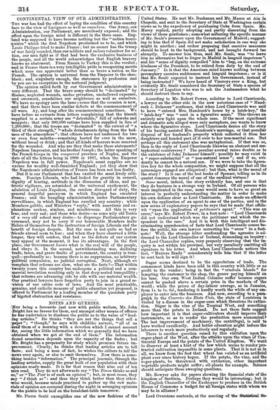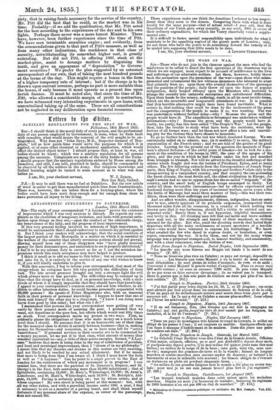NOTES AND QUERIES.
ibTin being a favourite just now with public writers, Mr. John -Bright has no favour for them, and amongst other means of offence he has undertaken to disabuse the public as 'to the value of " lead- ing articles." He thinks "they are not the things that sell a paper " ; "though," he says with childlike naivete, "all of us read them of a morning with a devotion which I cannot account • for, seeing the little information which we generally find we have obtained when we get at the end of them." The information found sometimes depends upon the capacity of the finder ; but Mr. Bright has a propensity for study which promises future im- provement. Clearly, he thinks that leading articles are to tell facts; and being a man of fact, he wishes the editors to tell the news over again, or -else to omit themselves. Now there is some- thing besides " information." The principal journals, through the leading articles, supply the great bulk of our population with their 'opinions ready-made. It is for that reason that nine out of ten men read. They do not afterwards say " The Times thinks so and so," or " The Post is of such an opinion"; but, in most cases, they say "I think so" : and thus they think better than they other- wise would, because minds practised to gather up 'the raw mate- rials of opinion are occupied during the night in arranging opinions for the public to be laid on the breakfast-table tomorrow.
Mr. Pierre Soule exemplifies one of the new fashions of the
United States. He met Mr. Buchanan and Mr. Mason at Aix in Chapelle, and sent to the Secretary of State at Washington certain 'views as to the expediency of purchasing Cuba from Spain. Mr. Marcy replied, partly adopting and partly dissenting from the -views of those gentlemen ; • somewhat softening the specific manner of Mr. Soule's pressure upon the -Government of Madrid ; suggest- ing to him that if Spain did not make satisfaction in one way she might in another ; and rather proposing that coercive measures should be kept in the background, and not brought forward too abruptly. To answer 'him thus, said Mr. Soule, was ":to leave him no alternative but to linger in Madrid in languid impotence"; and his "sense of dignity compelled ".him to "beg, on the extreme kindness of the President, to be retired.from duty by the end of January." Is it that the American mind knows nothing between peremptory coercive suddenness and languid impotence.; or is it that Mr. Soule expeoted •to instruct his Government, instead of being :instructed ? We have heard of Viceroys over a Ring, but evidently Mr. Soule ,considered the Secretary -of State a species of Secretary of Legation who was to ask the Ambassadors what he should instruct them to 'say.
According to Mr. Robert Power, solicitor to Lord -Clanricarde, a lawyer on the other side in the now notorious -case of " Hand- -cock v. Delacour "confesses, that when Lord Claurioarde was said to have " entered Mrs. Handcock's house by a latch-key," the " latch-key" was " used in a figurative sense." This throws an -entirely new light upon 'the whole ease. If the most ,significant and dramatic acts alleged were only metaphors, one wants to know -where •the figurative stops. Lord Clanrioarde denies all the story -of his having assisted Mrs. Handcook's marriage, or that peculiar 'disposal of her husband's property which collected it from her 'daughters and handed part of it over to her non-marital son. But perhaps all this statement also was -metaphorical. If that was so, then is the reply of Lord Olanricarde likewise an abstract and me- taphorical controversy ? The peculiar avowal raises doubts as to 'the existence of John Delaoo-ur himself : possibly he may exist in a " super-substantial" or " non natural sense "; and if so, evi- 'dently he cannot be a natural son. If we were to take the figura- tive key for the whole •composition, we might suppose that all the personages engaged are allegorical : but then, what is the moral of 'the story ? Is it one of the lost books of Spenser, telling us in its lemint romance 'the moral of one of the cardinal virtues ? Some moral, indeed, the story evidently 'has, and -one is that they do business in a strange way in Ireland. Of-all persons who 'were implicated in the ease, none would seem to have so great an interest in perfectly understanding the matter in order to make his own defence clear as Lord Clanricarde. He made an affidavit upon the -application of an agent -to one 'of -the parties, and in the new series of •explanatory papers be says that' e made that affida- vit "upon the application of petitioner's agent." "This was an -error,' says Mr. Robert- Power, in a footnote " Lord Clanrioarde did not understand which was the petitioner and which the -re- spondent in the case." And it is with this intelligent and dis- criminating apprehension of facts that Lord Clanriearde -comes be- -fore the public, his own lawyer correcting his " error " in a foot- -note! Well, the strange letter -confounding the agencies is ad- 'dressed to the Lord Chancellor of Ireland, demanding an inquiry : the Lord Chancellor replies, very properly observing that the in-
• quiry is not within his province, but very peculiarly omitting-all signature to his letter. And when Lord Clanriearde notices the fact, " Maziere Brady" -considerately tells him 'that if the letter be sent back he will sign it!
Sugar seems destined to be the opprobrium of trade. 'The commonest kinds have been sold in this country with little or no profit to the vendor; being in fact the " crustula blande" for tempting 'the customer to the shop, 'the grocer paying himself on his teas. Our own West Indian Colonies suffer because sugars cannot be pushed above a certain price in the markets of the world ; while the prices of day-labour -average, as in Jamaica, from ls. to ls. 64, rendering it hardly worth the while of any em- ployer to enter into the business. And now, according to a para- graph in the Courri-er -des Etats Unis, the state of Louisiana is visited by a disease in the sugar-cane which -threatens its extinc- tion. Sugar is the vine of the Tropical West, and something more than the potato to Ireland. Do not these facts suggest how important it is that sugar-cultivators should improve 'their instruments, so as to render the production more economical P 'The last improvement of machinery, the centrifugal, is said 'to have -worked. excellently. And better education might induce the labourers to work more productively and -regularly. There is another question raised by this visitation upon the sugar-plant of the West, after the attacks-upon the vines of Con- tinental Europe and the potato of the United Kingdom. We want to discover at least a hint of the law which seems to render pro- tracted cultivation impossible in some plants. That it is not so in 'all, we know from the fact that wheat has existed-as an artificial plant ever since history began. If the potato, the -vine, and the sugar-plants, be threatened -with extinction, other important vegetable products might suffer; oil-plants for example. Science should anticipate these sweeping questions.
Mr. Bowyer asks for papers showing the financial state of the kingdom of Sardinia. Perhaps they would be interesting; but is the English Chancellor of the Exchequer to produce in the British House of Commons a budget for all foreign 'states with whom we may be -in alliance ?
Lord Overstone contends, at the meeting of the Statistical So-
i3iety, that in raising funds necessary for the service of the country, 31r. Pitt 'did the best that he could, as the market was in lie time. Probably—if we add the qualification, that Mr. Pitt sated ,for the best according to the -experiences of the dayand to his .own lights. Perhaps there never was a more honest Minister. There have, however, been further experiences since the time of Pitt. "We have seen terminable -annuities expire ; and .evidently, from 'the coln.mendations given to that part of Pitts measure, as well as from many other indications, the confidence in that class of .security, :notwithstanding its somewhat higher cost, _is greatly extending. But did not Pitt, in offering 1001. stook At the market-price, Assist to derange matters by disguising the 'truth, and give an appearance of " depreciation " to 'Govern- ament securities ? We prefer the plan suggested by an esteemed correspondent of our, own, that of taking the neat hundred pounds At the terms of the day. This might require a bonus in ;the form of a higher temporary rate of interest ; but if the charge:is to be ;thrown upon-current revenue, perhaps no part is more suitable than the bonus, if only because it must operate as ,a present fine upon lavish finance. It must be noted also, that since the time of Mr. ,Pitt, who allowed a considerable margin of profit to -contractors, :we have witnessed veryinteresting experiments in open loans, with !uncentralized taking ;up of the same. These are all considerations not.be neglected in.any deliberation upon financial resources.



























 Previous page
Previous page